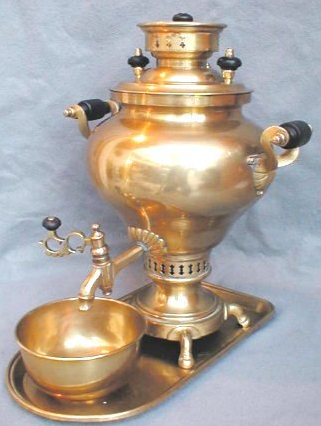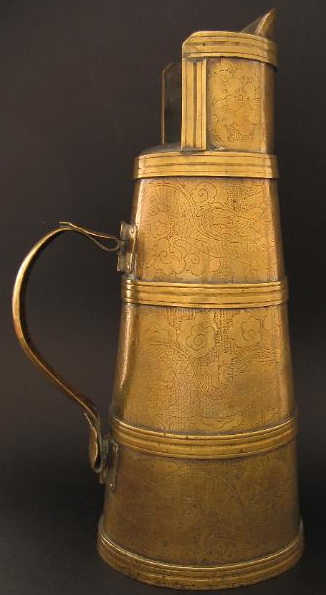This story is entitled: A Samovar for Colonel Sampilov
In the village of Uldurga1 arose a big fuss. From mouth to mouth travelled news, which caused its hearers to gasp out loud with excitement. Here is what happened:
The son of Yampil, the clan’s headman, home town hero, graduate of the Emperor’s Military Academy of Saint Petersburg, Colonel in the Czar’s Army, first military doctor of Buryatia, participant in the war of 19052, Bazar-Sada Yampilov was coming to visit his home stomping grounds3. And he wasn’t coming alone! His wife, who some said was Russian, others German, but at any rate not Buryat, was coming with him!
The elders and respected citizens of Uldurga gathered to council together.
“How shall we welcome our countryman, our dear guest?” Asked one esteemed elder. “With tea4 and refreshments as we usually do.” the people answered.
“Of course, of course, but what type of tea?” wondered the elder. “Our dear Bazar-Sada has lived for a long time among Russians, he must have forgotten our Buryat dishes and drinks. And furthermore, his wife is Russian . . .
“That’s true! Why didn’t we think of that?” agreed the people of Uldurga, duly impressed by the shrewd mindedness of their own elder.
“It looks as if, continued the elder, scratching his wise brow, we need to prepare a Russian feast.”
“Most certainly.” Nodded the village people.
“And the tea must be served from a samovar.5”
“Absolutely, we can’t pour tea from our simple pitchers!”
“Where can we obtain a samovar?” exclaimed the elder all a worry.
Everyone looked at one another. The old man collected in his minds-eye every last utensil the people of Uldurga owned, it’s true, in those days everyone knew exactly what everyone else owned. In the homes were cast iron and copper pots, silver pitchers, drinking bowls, gold plated and zinc coated serving dishes, but a samovar? There is not one trace! Nobody owns a samovar.
“What shall we do?”
“Send riders to the neighboring regions.” after some pause for thought declared the wise elder.
“Consider it done!”
Immediately they gathered all the daring young fellows and issued this brief command:
“Though it cost you your blood, deliver us a samovar!”
The young riders tore away in every direction, hell bent for leather. The next day one rider returned, hugging before him on his saddle like his very own new bride, a big bellied, three-bucket capacity, Tula6 made samovar. The young man broke into such a grin that it was hard to tell if it was his face sparkling so bright, or the treasured serving vessel polished to a high shine.
“You’ve done it!” Exclaimed the rejoicing village-folk giving the rider a hero’s welcome.
Soon there after the guest unexpectedly arrived in a horse drawn carriage. There he was, Bazar-Sada Yampilov in a colonel’s full dress uniform, with golden epaulettes, a chest full of medals and a long saber strapped to his left side. With him was his wife, a large of nose and haughty German in a full length European dress with a silk parasol in hand.
The throng of glad hearted villagers lauded their highly esteemed native son and his wife, brought them to the best house in the village, sat them in the place of honor at the table covered with Russian fare, poured the brewed tea concentrate into tea cups that even sat on their little saucers, which by the way, were also difficult to come by, added boiled water from the samovar and delivered their guests their tea, not having forgotten the corresponding necessities to a proper Russian tea, those being sugar, jam and silver tea-spoons. They sat for some time, indulging in tea, chatting teatime chats, when suddenly Bazar-Sada said over the chatter:
“It’s amazing how quickly you have accepted Russian customs. You even serve tea from a samovar. I have been dreaming and dreaming of drinking our own Buryat tea.”
At this point his German wife, who up until now had been sitting blankly among the enlivened Buryat conversants, perked up, when she recognized some familiar words, and having caught the gist of the discussion, with a thick German accent loudly declared in Russian: “Yes, yes Bazar-Sada has been longing for Buryat tea. He has been constantly repeating to me, ‘”When I go to my homeland I will drink Buryat tea!”’
Immediately all the eyes of Uldurga focused on their elder. The elder simply grunted, squinting at the big-bellied samovar.
* As told by Tsevegzhavin Erdenechimeg a fellow tribesman of Yampilov. From the book, “Steppe Stories and Tall Tales” pgs. 247-248. Story takes place after 1905 and before 1917, I believe.
Notes:
1. Uldurga is a village in Yeravninsky Aimag (District), in the Republic of Buryatia, Russia. (Buryatia is part of Siberia.)
2. The war of 1905 was the Russo-Japanese war.
3. The word used here is “Kochevie”, which basically means “where nomads roam.”
4. Tea in this case does not mean simply the beverage, but rather a feast.
5. Samovar is a large ornate pot especially devised to boil water for tea. The word literally means “Self-boil”.
6. Tula is a city located to the far west in Russia, famous for its samovars.





